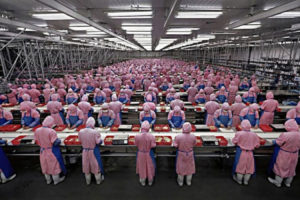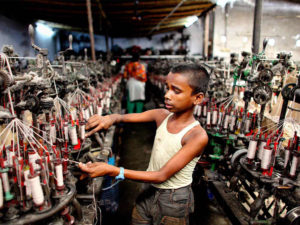Many businesses recognize the value of the "Made in America" tag, but they don't want to face the challenges of producing domestically. Instead of manufacturing here, some import pre-made products from overseas, assemble them in the U.S., and slap on the "Made in the USA" label. In reality, these products are mostly sourced from abroad, using foreign materials and labor. These companies are essentially capitalizing on a legal loophole by claiming they're American-made when they're really just assembling components. They avoid mentioning that most of the work happens overseas, leaving consumers misled about the true origin of their purchases. Some companies even go so far as to claim "American Assembled," but the vast majority opt for the deceptive "Made in America" label. The Federal Trade Commission (FTC) is tasked with monitoring deceptive marketing practices, but the current laws only apply to specific sectors like cars, textiles, wool, and fur products. There's no requirement for other products to accurately label their U.S. content, allowing companies to mislead consumers with false claims. This lack of oversight lets businesses profit off patriotic sentiment while outsourcing jobs and resources overseas. By doing so, they harm both local economies and environmental standards, since foreign factories often operate without stringent regulations. When companies move production overseas, they deprive Americans of job opportunities. This reduces our nation's economic self-sufficiency and creates dependency on foreign suppliers. Fewer manufacturing jobs mean fewer chances for future generations to thrive economically. Manufacturing overseas contributes significantly to global pollution. Foreign factories often lack proper environmental regulations, leading to unchecked emissions and waste. Meanwhile, U.S.-based manufacturers adhere to stricter guidelines aimed at protecting air quality and reducing carbon footprints. Foreign factories frequently disregard basic labor rights. Workers endure harsh conditions, long hours, and minimal compensation—sometimes including child labor. Every purchase made from such sources indirectly supports exploitative practices abroad. Poor labor conditions combined with lax environmental policies perpetuate cycles of poverty and environmental degradation. Many overseas manufacturers claim compliance with U.S. standards but fail to deliver consistently high-quality goods. Consumers expect excellence when buying American-made items; however, unethical producers tarnish America's reputation by selling subpar products under misleading labels. Take Waterstone Faucets as an example—they proudly declare themselves fully American-made. Their entire process takes place in Murrieta, California, including design, engineering, fabrication, and assembly. While sourcing certain small components like plastic O-rings remains challenging due to declining domestic manufacturing capabilities, they still manage to maintain over 99% domestic content across all products. Such transparency sets them apart from less scrupulous competitors who exploit vague labeling rules. Next time you shop for Made in America goods, remember that informed decisions make a difference. Support ethical brands committed to strengthening our economy while preserving environmental integrity. Together, we can promote sustainable growth and uphold quality standards for generations to come.  Komatsu Swing Parts,Komatsu Swing Gearbox Parts,Komatsu Swing Motor Parts,Komatsu Excavator Swing Parts JINING SHANTE SONGZHENG CONSTRUCTION MACHINERY CO.LTD , https://www.stszcmparts.comMade in America?
 For decades, the U.S. has seen a steady decline in domestic manufacturing. Since the '70s, cheaper imports have flooded our markets, making it harder for consumers to find authentic American-made products. While many brands tout the "Made in America" label, not all of them follow through on that promise. Companies are finding loopholes to exploit this label without putting in the effort or investment required to truly support American jobs and industries. This raises serious concerns about transparency and honesty in consumer goods.
For decades, the U.S. has seen a steady decline in domestic manufacturing. Since the '70s, cheaper imports have flooded our markets, making it harder for consumers to find authentic American-made products. While many brands tout the "Made in America" label, not all of them follow through on that promise. Companies are finding loopholes to exploit this label without putting in the effort or investment required to truly support American jobs and industries. This raises serious concerns about transparency and honesty in consumer goods.What's Really Happening?
Why Isn't This Being Stopped?
Why Should You Care?
 You might wonder why this matters. Choosing to import rather than manufacture locally has several negative consequences:
You might wonder why this matters. Choosing to import rather than manufacture locally has several negative consequences:
How Can You Tell the Truth?
 To ensure you're supporting legitimate American manufacturers, research thoroughly before purchasing. Check websites for fine print details—if a brand claims "Made in America," verify whether it specifies "Assembled" instead. Contact customer service directly to inquire about sourcing specifics. Ask where exactly their facilities are located and who provides raw materials. Reputable firms won't hesitate to disclose this information openly.
To ensure you're supporting legitimate American manufacturers, research thoroughly before purchasing. Check websites for fine print details—if a brand claims "Made in America," verify whether it specifies "Assembled" instead. Contact customer service directly to inquire about sourcing specifics. Ask where exactly their facilities are located and who provides raw materials. Reputable firms won't hesitate to disclose this information openly.